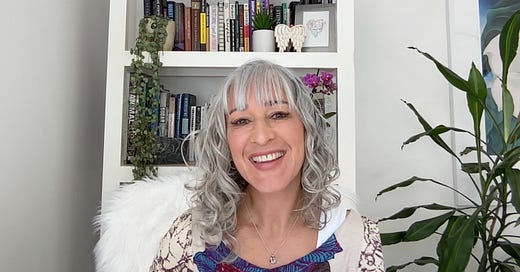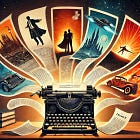Hi there!
Welcome to this masterclass on genre. This class is for paid members of
.We’ll look at
what genre is,
why it’s useful to understand genre,
how you can innovate within your genre,
and then we’ll take a deep dive into the crime fiction, suspense, thriller genre, breaking it down into categories and sub-genres. If this isn’t your genre, it’ll help you see how to do this for your own genre, or genres if you’re writing a cross-genre book (including non-fiction!).
finally, we’ll look at the main conventions within this genre, using my psychological thriller, The Stolen Child, to explain the concepts.
You might find my article for
on genre helpful, if you missed it.You may even want to get a copy of The Stolen Child HERE so that you can follow along!
This is the first in a mini-series of masterclasses dealing with plot and structure. You can find my curated series of articles and masterclasses here: How to Plot.
The handout is below, with key information and the details of the exercise.
Let’s get started!
In today’s masterclass, we’re going to talk about genre in fiction.
Genre, according to the Cambridge Dictionary, is:
‘a style or category, especially in the arts, that involves a particular set of characteristics.’
I’m going to use the genre that I mainly write in - crime fiction and thrillers - as an example, and I’m going to break it down using my psychological thriller, The Stolen Child. So, if you haven’t read it and would like to, I’d recommend reading it if you can, but I’ll try not to give too much of the plot away!
There’s a three main reasons why genre is important.
First, from a publisher’s point of view, genre is a useful way of categorising and marketing an author. Generally, publishers pay for a book an author has already written, and offer an advance on a book, or multiple books, that the author will write. They’re investing in the author and the author’s future work. They’ve spent time and money marketing the author within a genre, building their brand, talking to the press, book bloggers, readers, book sellers and literary festivals, about the author as a crime fiction or a fantasy writer, say. They want a return on their money. So, unless they have a name that will sell books—any book—they want more of the same but slightly different.
Secondly, for readers, they’ve also invested in an author, paying for their book, or spending time seeking out a copy in the library, and then reading the book. If they liked the writing and the story, they too will want more of the same but different.
And then, finally, understanding about genre can help you as a writer. It can help you work out how to structure and plot your book.
Conventions and expectations:
In this masterclass, I’m going to talk about the conventions and expectations in fiction within a particular genre.
It’s going to sound as if I’m giving you rules. What I’m actually doing, is going through some of the conventions within a genre, and within fiction in general, and the expectations that the reader and your publisher will have of your work.
I don’t like rules. I don’t like being told what to do, or being told what I should have done if I’d know the rule in advance.
But if you know what the conventions and expectations are, you can decide how to put an original spin on them. You can decide whether to bend them, break them, flex them, or ignore them. But it’s worth knowing what they are.
For example, in a romance, readers expect that two people will fall in love. I mean, if there’s no love, at all, then it can’t be a love story, right?
And other conventions in this genre is often that there’s a love triangle, so it’s not straightforward, girl meets boy, they fall in love and live happily ever after.
Readers often expect, at least, a kiss by the end.
And by the way, this genre is one of the hardest to do because it’s difficult to make it original.
So you might do this by coming up with a different version of who falls in love with whom, for instance, in Heartstopper where it’s two male school students who fall in love, one is gay and one is bi-sexual, but he doesn’t know that at the start. (And then all their friends fall in and out of love, with various different twists, such as transgender and non-binary relationships and different love triangles and complications getting together or being pushed apart).
Or it could be a love story (rather than a narrow version of romance) between a child and a dog, a mother and her son, a human and a robot, or between robots, such as the movie Bladerunner and the TV series, Humans, or maybe between two aliens.
Instead of the traditional kiss, we need something else that satisfies that need the reader has in this genre. The dog finally stops trying to bite people and licks them. The aliens have some other form of mating ritual.
But if you don’t want to have a love story in your story, then this isn’t the genre for you.
If this sounds restrictive, think of the quote by TS Eliot:
‘When forced to work within a strict framework, the imagination is taxed to its utmost - and will produce its richest ideas. Given total freedom, the work is likely to sprawl.’
Focus on thrillers:
I’m going to focus on the thriller genre - by which I mean thrillers, crime fiction and psychological thrillers, suspense fiction and so on, as that’s what I’m writing in, but much of what I’m going to talk about will apply to some extent to any type of fiction.
I’m going to break down the crime fiction genre for you, but if this isn’t your genre, you can see what I’m doing and do the same thing for whatever genre or cross-genre book you’re writing.
And by the way, this works for non-fiction too. For instance, I’m also writing a nature memoir, so that’s a cross-genre between nature non-fiction and memoir, so I need to have some awareness of the expectations and conventions of both of these categories.
‘Crime fiction is one of the finest and broadest forms of fiction. Finest because the writer has to create an utterly believable world while keeping the reader guessing, turning the page, siding with the characters and enjoying the story. And broadest because it takes in everything from the hard-edged cop thriller to the twisted psychological end.’
~Julia Crouch
So let’s have a look at some broad categories of thriller and ask why they’re important to your plot and structure.
Listen to this episode with a 7-day free trial
Subscribe to Wild Writing with Sanjida to listen to this post and get 7 days of free access to the full post archives.













